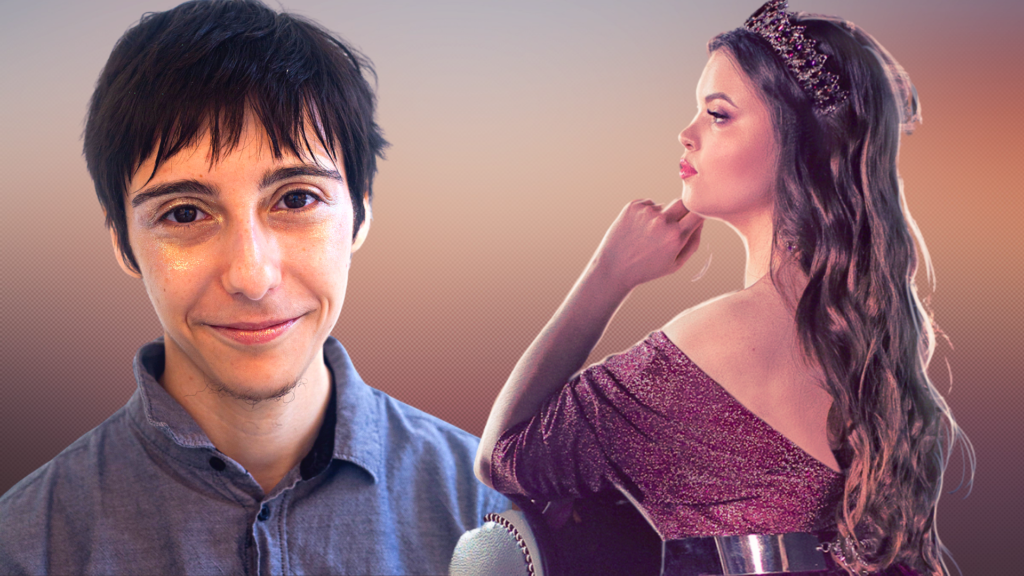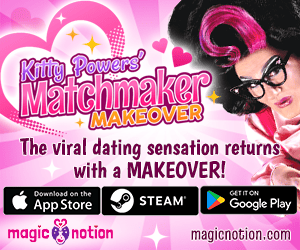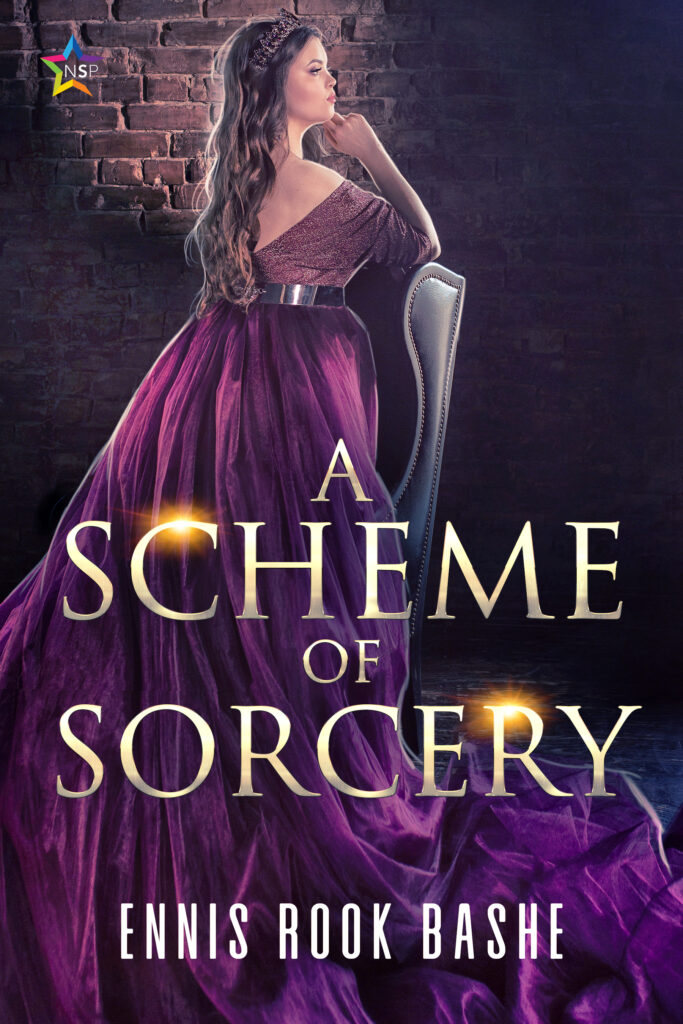
Spotlight Interview: Ennis Rook Bashe
Lesfic Bard Awards winner and a featured author in Strange Horizons, Liminality Magazine, and various zines, Ennis Rook Bashe is a disabled, non-binary poet and novelist who, when they aren’t working on new literature, is obsessed with everything gaming.
They’ve been interested in LARP (Live Action-Role-Playing) games for several years now, which has often helped them deal with the trauma connected to their disorder, Ehlers-Danlos Syndrome. With LARP and several other kinds of comics and games, Ennis has found that they’ve also been a healthy source that has had nothing but a positive impact on their life.
Their latest work is A Scheme of Sorcery, which explores the complexities of queer identity in a fantasy setting.
We got the chance to talk to Ennis about how games and online communities like fandom has not only helped them but inspired their work of several queer romance/speculative fiction novellas.
Hi Ennis! You’ve previously described yourself as a ‘gay nerd who spends a lot of time on the Internet.’ How has that time on the internet developed your love for fiction and has it impacted your writing?
The Internet was the first place I met other people who loved to write, from the nice grownups who were okay with a middle-schooler coming to their NaNoWriMo meetup event, to the encouraging strangers in other time zones who said they loved my fanfiction. I even ended up going to summer writing programs that I found online, and I would never have had the confidence to start self-publishing or even submitting my work if not for those friends and opportunities.
Despite being a former theatre kid, I’m pretty shy offstage, so talking to people on the internet has always been less intimidating.
Your first novella was Bluebell Hall and you were in high school at the time. How did you find the time to create this novella and what changed after you completed and published it?
My situation is pretty unusual – I did a combination of early college and online classes for high school. As a result, I had more free time than the average teenager. When I started publishing and saw people who didn’t even follow me on Tumblr discussing my work and even making fan art for it, I knew I wanted to keep putting my work out there.
How has living with Ehlers-Danlos Syndrome impacted both your personal life and career?
Before I developed serious symptoms, I was majoring in theatre. My post-college plans involved backpacking across the world and going on lots of auditions, and I dashed off short stories in the bathroom at parties. My peers loved Zumba classes and networking over beer pong, and couldn’t live without their 9 AM stage combat cardio. When I started dealing with joint pain and migraines, I was no longer seen as part of the artistic community. Strangers even made fun of me on anonymous apps for the way I moved.
I started spending a lot of time in my room online. The writers I met on Book Twitter didn’t care that I was lying down in bed when I spoke to them. It was amazing to finally be in a community where talent mattered more than appearances. I figured I’d try to spend the time when I was stuck in my room working on something productive, and I drafted the book that eventually became A Scheme of Sorcery.
Queerness is becoming more and more accepted in contemporary culture, but what are your thoughts about disability within spaces like literature, TV/Film, video games, etc?
Disabled people are still kind of invisible. And when we are visible, our stories are often told by abled people to seem as tragic as possible, usually ending with the dramatic death of the disabled person, unless they get better, in which case they can have a happy, normal life.
I sensitivity read for my multiple marginalizations, and people would never dream of saying “This trans character decided to go back in the closet, so now he gets a happy ending!” but “This disabled character is happy because he’s indistinguishable from an abled person after throwing away the mobility devices that are helping him get from place to place” pops up a lot.
The most well-known diverse book about a sick teenager ends with the twist ending that she’s not actually sick and her mom was just BSing her. Meanwhile, some of the first YA books by and for people with chronic illnesses are getting nowhere near the amount of attention they deserve. We need to stop thinking that books written by parents or friends of disabled people are acceptable representation and start pushing publishing to do better, and when I say “we” I mean everyone.
What’s your opinion on queer writers self-publishing – do you think it’s a worthwhile route to go vs going to a publishing house?
Self-publishing is a project, and the amount of work and time you need to put into it depends on what your goals are. If you want to have a professionally designed cover, release print copies of your book, and do advertising, it’s going to take more time, energy, and money than just throwing a Word document up on Kindle Unlimited with a cover you made in a free photo editor. I take the second route, and I find my fellow writers on the first route very impressive.
I don’t think self-publishing is a solution to bias in the industry, but it can be a good way to get stories out there.
Could you tell us a little more about your current project, A Scheme of Sorcery?
Sariva al-Beroth is a new lady-in-waiting who’s tired of being seen as an outsider because of her religion, and Edwynne Dovecote is a trainee squire who’s recently discovered that she was adopted and that her birth parents practiced a religion she knows nothing about.
When Sariva finds Edwynne’s questions offensive, it’s hate at first sight. Then the queen falls under a dangerous curse.
Forced to work together to rescue her, they’re thrown into one life-threatening situation after another. As they deal with dangerous underground ruins, extremists who want to take over the country, and angry ghosts, they realize maybe they don’t hate each other after all… and that they might even be falling in love.
If you like enemies-to-lovers and butch/femme dynamics, maybe consider checking out my book!
How has comics, LARP and general video game geekery affected you?
Something I love about LARP and tabletop games specifically is all the different experiences I’m able to have. I’ve never been peer pressured into committing cannibalism by the light of an unearthly violet flame, palmed a magic stone of immortality while a god was looking at me, or tried to knock a Sasquatch unconscious- but my LARP characters have! And I can use those feelings and emotions in my work. Even though on some level I know that I’m not really in danger and the King of the Trolls is just my buddy Dan in a rubber mask, or that the tragic zombie I’m going to have to mercy-kill will be meeting up with me at a diner Sunday afternoon, situations in LARP often feel incredibly real.
What has the reception to your work been like?
One time I had someone message me on Tumblr saying that they decided to leave their abusive partner after reading one of my novellas. Another time a disability activist wrote a blog post about how she burst into tears on public transportation because she felt represented by my work in a positive way.
Moments like that admittedly don’t happen every day, but they make all the hard work feel worth it.
Have you ever considered moving away from just writing creative literature to creating stories within video games, tabletop games, etc?
I’ve done design work for tabletop games previously, such as a playbook inspired by Bucky Barnes for the superhero tabletop game Masks; an adventure for Moonpunk, the punk-rock game about sci-fi activists; and I’m currently developing modules for Wanderhome after I was named a recipient of their creator grant.
I’ve played around with making digital choose your own adventure games, but video games require skills that I don’t have. One of my friends recently worked with a team to make a video game, and that would be a dream come true for me! I’ve also been toying with the idea of writing a podcast – ideally I’d be able to rope in a friend to do the audio engineering!
Basically, as long as I don’t have to learn STEM skills, I love every form of storytelling and would love to discuss collaborating on any project.
Is there anything else you’d like to add for our readers?
I also want to mention one of my other works, the novella Rescued by the Married Monster Hunters, which is something that I’m very proud of.
It’s about a gentle bug-man who’s cast out and sentenced to death because he’s too kind to outsiders, which is considered a crime in his culture. He manages to shapeshift into something resembling a human, and when he meets the monster hunters who’ve shown up to stop the other bug-people from eating all the local villagers, he falls in love.
Even though it deals with some dark themes, reviewers have described it as nurturing, comforting, and inclusive. The main character gets cuddles and blankets and the opportunity to stab his fascist abuser. Also, all the main characters are disabled and/or chronically ill. The reason for that is “because I can.”
I’m working on a book 2 in the series, so you should buy the first one now!
Interested to know more about Ennis Rook Bashe and their work? Check out their official website.






